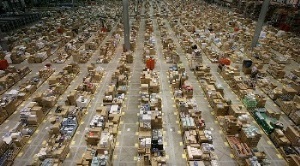Amazon warehouses – the backbone of its effectiveness – have from an early stage been built completely random: stuff is stored wherever there is space. The computer system tracks everything and the company has found that it is more effective that way – less time to find where to put things, and more change to have a set closer when picking it up. It also saves space and makes space utilisation more efficient.
 This Quartz post explains it all: ‘Amazon: This company built one of the world’s most efficient warehouses by embracing chaos‘.
This Quartz post explains it all: ‘Amazon: This company built one of the world’s most efficient warehouses by embracing chaos‘.
This story is quite similar to what happened with emails: while in the past I used to sort painstakingly my emails in various folders, I just leave them in a dump nowadays and use powerful search features to find what I need. Email sits there in a random order, and I use another way to access the information I need.
With the increased power of mobile computation and networks, more and more applications will pop up for intelligent randomness. There are still a lot of areas where we do take the effort to sort things by categories; it is useful to consider whether this still makes sense nowadays.
It is amazing how randomness can be leveraged for increased efficiency and effectiveness!

Published on April 10, 2018 04:30
